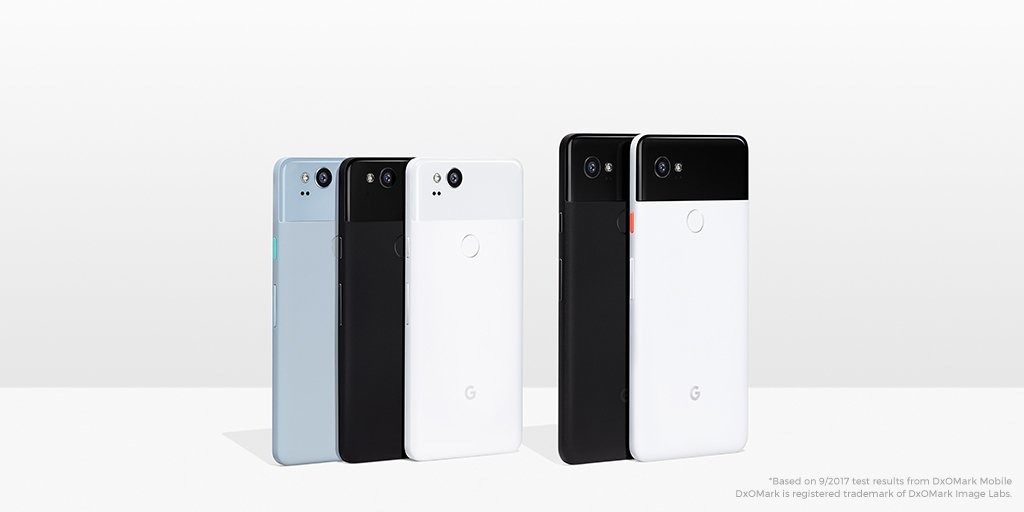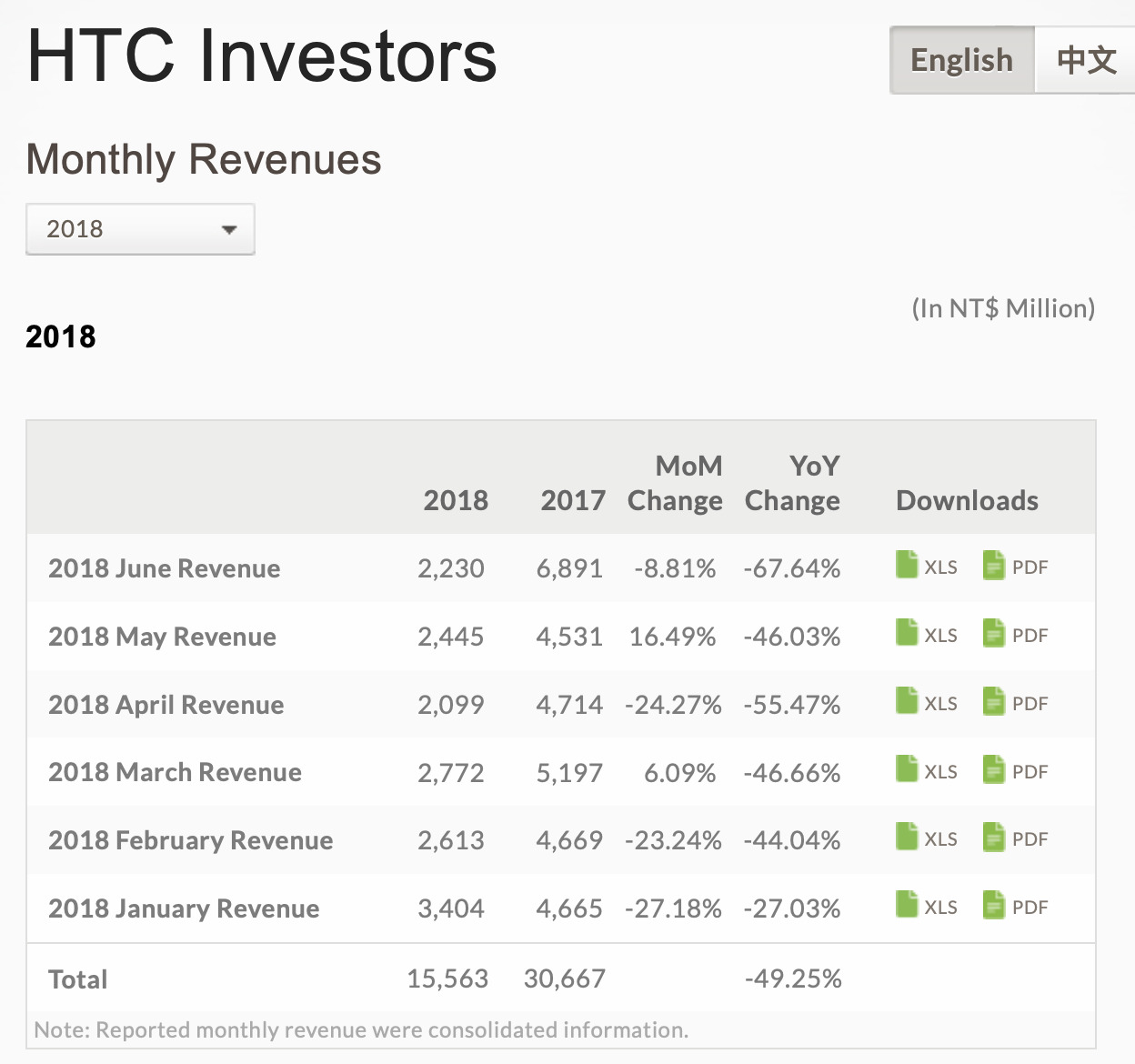Ten years ago, Google offered Taiwan's HTC a lifeline of sorts in the form of an Android partnership for the original HTC Dream, followed by Nexus One. However, the former Windows Mobile contract manufacturer hasn't fared so well since. Google's last two years of HTC-built Pixels have done nothing to help the struggling company.
Google's Pixelation of HTC
HTC reports revenues monthly, charting out a sad story of Android tears that began in earnest back in 2010 when Google partnered with the Taiwanese phone maker to produce Nexus One.
HTC had been a contract manufacturer for a series of Windows Mobile vendors. Its growth was blunted with the introduction of iPhone, but its early partnership with Google's Android brought it back to 67 percent annual growth in 2011. Then things went badly.Google's Pixel is effectively helping to starve its own supply chain to death
HTC's own phones were destroyed by Android peers when Google's Nexus subsidy passed to Samsung, LG and Motorola. Its next collaboration on Google's Nexus 9 tablet was a bust. Selected by Google to build the Pixel, HTC's sales slipped again. And despite building the Pixel 2, HTC continues to report a bloodletting.
Why did two generations of Pixel phones perform so badly? Google pursued a software-first strategy that promoted exclusive, proprietary camera features other Android phones didn't have. But there was little else offered to make Pixel competitive with other Androids that cost far less than Google was asking. And nothing about Pixel or Pixel 2 really offered anything to compete with last year's iPhone, let alone the newest iPhones Apple had released at the same time.
In dramatic contrast to Apple's supply chain expertise, Google's Pixel is effectively helping to starve its own supply chain to death. Yet while sources from Bloomberg to the Wall Street Journal and Japan's Nikkei desperately search for potential problems among the often-false rumors surrounding Apple's tentacles of production, there's been nothing but glowing admiration for Google's wholly incompetent decade of ineffectual stabs at building a hardware business.
There's not even any pointed criticism of Google's round robin strategy of throwing resources at one Android licensee, then yanking support to work with another. When Apple switches suppliers, there's full, detailed coverage of the poor plight of the company that loses its business. Apple is even held to blame for App Store developers who can't find success. Yet nobody in Android land blames Google for the overall lack of commercial returns from Android. Among hardware partners, Android has also been problematic.
Despite Google's direct "help," HTC's revenues across the first six months of 2018 have collapsed by more than 49.25 percent over the year-ago period (which already wasn't so good). The YoY change in revenue is progressively getting worse on a monthly basis. In June, HTC reported a new peak plunge in revenue of 67.64 percent under the previous year. Last summer, HTC reported a summer bump in sales that totally failed to materialize this year. Instead, sales just kept dropping.
The Lethal Google Phone
Google's devastating impact on HTC is particularly notable because Pixel and Pixel 2 were supposed to be evidence that Google could produce an iPhone-priced, premium Android phone— if only it could bypass the incompetence and foolishness of its bumbling, adware-infatuated Android licensees. Yet after Google took the reins, HTC went from having problems to suffering a full-blown crisis.
Google's supposedly stellar "brand value," its series of sycophant columnists installed at the Verge and elsewhere, and its tenacious grip on web advertising didn't help one iota to push buyers— not even Android fans— to pay a premium for Pixel phones (or tablets, which ended up canceled entirely).
This wasn't a unique event. Google previously destroyed any real hope for Nest by taking it over and seeking to align it with its true vision of Android. And before that, Google's takeover of Motorola— once hailed as a genius deal on the level of chocolate and peanut butter— turned out massive flops like Moto X, which not only failed to make much money but actually incinerated $700 million across just the last six months of its production.
The tech media appeared completely blind to any possibility that Google might not be widely successful in hardware, despite its foundering for years in failed attempts to produce phones, tablets, TV boxes and other experiments under the Nexus, Q, Chromebook and Pixel brands. Given Google's history before the phone, it should have been easy to predict that the company's best case scenario might be facilitating the production of cheap phones for the low-end, mass market, not a premium device to rival Apple's iPhone.
But just months before Google gave up and sold off the one-time American icon to a Chinese company, Steven Levy wrote the official company line in an article for Wired: "Moto X is the first in a series of hardware products that Google hopes will supercharge the mother company's software and services."
After Google's five generations of Nexus, two cycles of Moto X and two of Pixel, it's getting increasingly ridiculous to suggest that Google's well-established failure in designing, producing and marketing hardware is going to be reversed by new software update plans, new software technology, or a clever new machine learning software feature.
 Daniel Eran Dilger
Daniel Eran Dilger





-xl-m.jpg)


-m.jpg)






 Chip Loder
Chip Loder
 Thomas Sibilly
Thomas Sibilly
 Wesley Hilliard
Wesley Hilliard
 Christine McKee
Christine McKee
 Amber Neely
Amber Neely
 William Gallagher
William Gallagher
 Malcolm Owen
Malcolm Owen








112 Comments
"
I love lines like this. Classic.
2009-2011 were great years for them. HTC' unraveling dates back to 2012 when they started producing a plethora of bad phones, driven by a bit too much greed IMO. It's been downhill from there. The bad decision making was on HTC's part and not because of a paltry 2 or 3 million phones they built for Google.
Quoting from another source last year: "In the span of just three years, they released the Desire, Droid Incredible, Legend, Wildfire, myTouch 3G Slide, Aria, Evo 4G, Desire HD, Desire Z (aka the T-Mobile G2), Panache (aka the T-Mobile myTouch 4G), Gratia, Inspire 4G, ThunderBolt, Evo Shift 4G, Incredible S, Wildfire S, Droid Incredible 2, Nexus One, Merge, Sensation, ChaCha, Salsa, Evo 3D (the 3D didn’t work), myTouch 4G Slide, Evo 4G+, Raider 4G (aka the Vivid 4G and Velocity 4G), Rhyme, Evo Design 4G, Hero S, Amaze 4G, Explorer, Sensation XE, Sensation XL, Rezound, One X, One XL, One S, One V, Evo 4G LTE, J, Desire C, Droid Incredible 4G LTE, Desire V, Desire X, and J Butterfly.
It glutted the market with so many phones that it became hard for consumers to tell what was good (the Nexus One) and what wasn’t (the ThunderBolt)...
Nothing captures this better than the ThunderBolt incident. The phone was launched in March 2011 to great anticipation. It was the first device to come with access to Verizon’s LTE network. People were excited.
The early adopters didn’t count on HTC dragging its feet at every step along the way. The ThunderBolt got Gingerbread in late 2011, months after its announcement. It didn’t get Ice Cream Sandwich until February 2013, well after the release of 4.2 Jelly Bean.
One of the reasons why it takes HTC so long to update its phones is because of the high level of modifications it adds to stock Android. Each device runs Sense, its first-party custom skin. Pushing updates to its devices takes longer because each update has to be rewritten for the skin.
To make matters worse, Sense-ified Android was atrocious. Remember all those Gingerbread phones? Most of them didn’t have the hardware to handle the extra load from Sense. The skin slowed down the phone and mired users in a hell of launcher redraw and unnecessary modifications."
https://www.technorms.com/30768/analysis-htc-struggling-to-survive
Businesses come and businesses go. LG's smartphone business is no better off and for some of the same reasons. Samsung is hammering with marketing budgets only Apple can match. The Chinese manufacturers are willing to put off a little profit by making it difficult for the HTC's and LG's to compete on prices, a luxury they don't really have, and make it up later once the players weed themselves out a bit.
While it might play well with the audience not every bad decision and unlucky break (HTC/LG) or success story (Samsung/Xiaomi/Huawei) in the world needs to be laid at Google's feet IMHO.
Things haven't changed for the better since this old chart from 2014 explaining the rise and fall of HTC: https://www.techinasia.com/htc-rise-and-fall-infographic
Fun fact: A lot of the data from that chart was supplied by Horace Didieu so it should be trustworthy.
Google tried to kill iPhone. But instead it killed HTC.
Interesting article, especially as a former Nexus user for many many years. I switched to the iPhone permanently after the Nexus 5, which still remains one of my favorite phones of all time.
Google's execution over the years has been quite sloppy, especially at the high end. The appeal of the Nexus line was that it offered stock Android showcasing what Google really wanted it to be and the fastest updates possible. Why anyone would buy anything else was beyond me. Samsung was/is really the only other major player, much of that I attribute to their giant marketing budget as well as in-house component manufacturing. Android was built by Google for Google to succeed and the device manufactures were all expendable.
Apple's philosophy of limiting their scope while knocking it out of the park is what got me to convert to the iPhone. Once I got a MBP and saw the level of integration between devices it got me to stay. iMessages was also a leading reason as most of my non-tech friends/family had iPhones and had no desire to stray from what worked for their needs.
sigh, another rant.